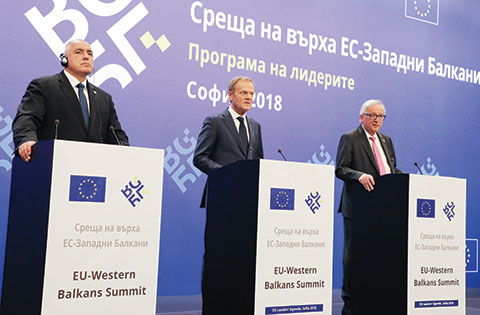 European Council President Donald Tusk (C) speaks, next to European Commission President Jean-Claude Juncker (R) and Bulgarian Prime Minister Boyko Borisov during a joint press conference during an EU-Western Balkans Summit in Sofia on May 17, 2018. -- AFP MARIN
European Council President Donald Tusk (C) speaks, next to European Commission President Jean-Claude Juncker (R) and Bulgarian Prime Minister Boyko Borisov during a joint press conference during an EU-Western Balkans Summit in Sofia on May 17, 2018. -- AFP MARINSOFIA: European Union leaders anxious to counter Russian influence sought yesterday to reassure Balkan states about their long-promised membership prospects, but warned they would not be joining any time soon. EU leaders met their counterparts from six Balkan countries for summit talks in Sofia, a day after a dinner that sought to forge a united front in the face of US President Donald Trump's "capricious assertiveness" on the Iran nuclear deal and trade tariffs.
The bloc faces a dilemma over Albania, Bosnia, Serbia, Montenegro, Macedonia and Kosovo-wanting to offer them enough to keep them out of Moscow's orbit without rushing to let them join before they carry out important reforms. French President Emmanuel Macron said he wanted the countries, collectively referred to as the Western Balkans, to have a "supported dialogue, a perspective", but warned against hasty moves.
"I am not in favor of moving towards enlargement before we have all the required certainties and before genuine reform has been made," Macron told reporters as he arrived for the summit. EU Council President Donald Tusk said the bloc would invest in infrastructure connections with the Balkans to boost development and bring them up to EU standards.
The EU is increasingly looking to take its fate into its own hands as a transatlantic rift grows with Trump, who withdrew from the Iranian nuclear deal and wants to slap tariffs on European steel and aluminium. Tusk launched a stinging attack on Trump, while adding that he was helping Europe in a way because it had "got rid of all illusions" that it can rely on Washington. "Looking at the latest decisions of President Trump, someone could even think with friends like that who needs enemies," Tusk said on Wednesday.
Macedonia, Greece name row
After suspending any enlargement four years ago, the European Commission recently unveiled a new strategy for the region which aims to give membership to some states by 2025 -- the frontrunners to join are Montenegro and Serbia. In return Brussels wants reforms and a crackdown on corruption in the region.
But the six countries are growing increasingly impatient for a path to membership. Bulgaria's prime minister recently warned Russia and China will otherwise gain toeholds in the region. In the summit declaration, the EU outlined the theme of "connectivity" with investments in transport and infrastructure. It restated the EU's "unequivocal support for the European perspective of the Western Balkans" but avoided the terms "adhesion" or "enlargement"-EU code words for the path to membership of the bloc.
A European diplomatic source said objections to Balkan enlargement had come on two grounds: the need for the would-be members to reform and also the fractious state of the EU itself. "Some pointed out that the EU is not working properly with 28 members and so future enlargement should only come after internal reform," the source said. Membership issues are to be discussed in June when leaders decide whether to approve accession negotiations with Albania and Macedonia.
Without a "European perspective", the Balkans risk falling back into the "misfortunes we saw in the 90s" when Yugoslavia was tearing itself apart, European Commission chief Jean-Claude Juncker warned last week. Austrian Chancelllor Sebastian Kurz, whose country will take over the EU's rotating presidency in July, stressed the importance of keeping the door open. "The summit may be a symbolic act, but it can again trigger a little more dynamism," he said. "If there is no European perspective in the Balkans, then the Turkish influence and other influence becomes stronger and stronger. We don't want that to happen."
The EU is also wary of admitting new members before they settle their differences, particularly in a region still bedeviled by the aftermath of the bloody break-up of Yugoslavia in the 1990s. These include a bitter and long-running dispute between Macedonia and EU-member Greece over its name, which Athens insists refers to its own northern province. The leaders of Macedonia and Greece met on the sidelines of the summit. Spain's prime minister is staying away because his country, roiled by the Catalan independence drive, does not recognize Kosovo's 2008 split from Serbia. - AFP










